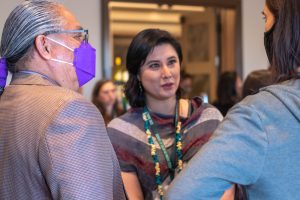Philanthropy always sounds like someone else: that’s the title of a report the Donors of Color Network put out last year, but it’s also a rallying cry for the organisation that convenes funders and networks to think about how to tell the stories of donors who are people of color and get more funding to communities of color.
Isabelle Leighton, the Executive Director of the Donors of Color Network, caught up with Alliance to talk about the network’s mission and work, including why telling the story of donors of color is so important and insights into their successful climate movement.
Elika Roohi: Tell me about the mission of the Donors of Color Network.
Isabelle Leighton: Donors of Color Network was founded in 2019, when our three founders came together. They had really diverse experience and really diverse networks, and they just saw that there was this huge gap in telling the story of people of colour who have been giving alongside social justice movements the whole time. And they felt that all the spaces they were in – whether organised or formal or mainstream philanthropy – left out the story of donors of colour. And they felt that it was necessary for us to make sure that these stories were being told, because it’s rich data – and also because we believed, and the founders believed, that if we did not tell the stories of donors of colour and how they’d been giving, we’d be leaving power on the table. We had this ability to actually influence philanthropy if we got ourselves organised.
So, the mission and the purpose of creating the Donors of Color Network is to provide a space for convening people of colour with wealth who are giving and supporting social and racial justice. And it is also to provide this advocacy lever within philanthropy. We’re also really interested in building this movement of donors of colour, so that we can start to create more interesting, innovative ways to give. This is something that is very new in all of philanthropy.
We advocate for funding within philanthropy and outside of formal philanthropy to go to people-of-colour-led movements that are focused on systems change. And we are also developing education and insights programming that supports the needs of donors of colour and tells the broader philanthropic community the story of donors of colour.
You said that philanthropy has left out the stories of donors of colour. How is your network working on changing this?
There are some really interesting ways to do it. We have a variety of initiatives that have been experiments. One of the major pieces of work we’ve done is creating a seminal research report called Philanthropy Always Sounds Like Someone Else. It’s a portrait of high net-wealth people of colour, and it tells the story of how these individuals – there were 145 individuals interviewed recruited through the networks of our founders – had been giving for quite some time and have just been under the radar.
The majority of fundraisers were not really approaching them; they weren’t really treated as if they were leaders. Some of them may have sat on boards, but they were not really been seen as the most influential, powerful person in that in that space. Yet they were already giving quite substantially and were also influential in their individual sectors. Nearly everyone interviewed shared personal experience of discrimination and bias personally within their careers and also within philanthropy. And more than 65 per cent of them were so-called self-made, they were the first people to have wealth in their families. Many of them give in ways that are very unique and outside of formalised philanthropy. We published this report in 2022, and since then we’ve been using it as an organising tool. Because what we found is that by lifting up these stories, we’re able to attract and recruit new people who want to also tell their stories and want to be part of this movement.
Probably what we are most known for is an initiative we launched in 2021 called the Climate Funders Justice Pledge, and this is intended to be an advocacy campaign that is directed at mainstream philanthropy. We identified who the top 40 climate funders were in the US and said that we wanted to make demands of them, because we found in our own research as well as our own lived experience that there was a very small percentage of climate funder supporting communities of colour. One of the studies that we often reference is that only 1.3 per cent of US-based philanthropy for climate funding goes to communities of colour.
This is completely unacceptable, and our members in 2021 thought this might be something that we should rally around. So that led to the launch of the Climate Funders Justice Pledge which has two parts. The first is that we demand the top 40 funders and anyone else who wants to take the pledge commit to being transparent about where their dollars go. The second part of the pledge is that they commit to increasing their percentage of giving to BIPOC-led movements to at least 30 per cent within two years. We are very proud of this campaign, because within the first two years we’ve been able to mobilise $120 million, and we’ve recruited 33 pledgers to sign on.
And then I would say a third piece of our work, which is much more emergent, experimental, is that we have been looking for ways to invest in more grassroots and local groups that have often been overlooked by political giving and democracy giving. There are a lot of organisations across the country, particularly in different states that have growing and thriving communities of colour where there is a lot of work being done on voter education and turnout, but these communities are not receiving a lot of the funding. They are often treated as if they don’t need that funding, because they’re already doing that work. So, a lot of the funding that comes from political giving goes to candidate infrastructure or goes to consultants who are not from the community.
We’ve been experimenting to see if there are ways that we can try to lift up the leadership of these community groups that are the ones doing the work, day in and day out, even in non-election years, to make sure that voters of colour are included. So, last fall for the midterms, we did a very quick, experimental giving project where we activated our members and distributes $290,000 to 26 organisations that were focused on turning out voters of colour. We focused on providing general operating support, what some folks call ‘no strings attached funding’, and the groups were eager to participate and share their insights on what was happening in the community. And we also found that our members were eager to learn from these groups. So, you know, it’s a big experiment. We’re trying to figure out what to do with it moving forward. But what’s innovative about it is there’s a direct connection between the community and the donor that doesn’t exist in most of mainstream philanthropy.
How many donors does your network work with?
We’re like a BIPOC or donors of colour ecosystem, which includes individual members and foundations that are supportive of our mission and send their staff, as well as other networks that are not necessarily comprised of all donors of colour but are invested in creating this ecosystem that supports donors of colour and racial justice. In total we have over 75 members that represent those three different types of constituents. It’s probably about half individual donors and divided probably a quarter and a quarter of the other two types.
Let’s come back to this idea of ‘no-strings-attached philanthropy’. I think there’s been a shift in the conversation recently, because of giving during the pandemic and also because of the impact of Mackenzie Scott’s grantmaking. How have you seen this conversation evolve in the time that the network has been around?
I know that a lot of philanthropy has been interested in trying to be more accountable and trying to trust community a lot more. I would say that many of the newer philanthropic groups really do align with this idea that if you are in a position of financial privilege then you have a responsibility to redistribute wealth to communities closest to the problems we are trying to solve. And that’s because the people closest to the problems have the best insight on what the solutions need to be.
But also, there is status quo or traditional philanthropy that continues to be pretty restrictive, right? It is challenging to get access to their funding now, but so many of our partners in the community said that some of these funders were excited to give and make special exceptions during 2020 or other crisis moments. But then they pull back their funding after. They’re not really willing to put risk out there the way that some individual donors – and particularly what I believe donors of colour – are willing to do.
So, you know, I think one of the things about this trend is that it really needs to be less of a trend and more of a long-term strategy. What I mean by that is a lot of philanthropy is really nervous about truly shifting. There are definitely some funders I know who have a fear of going beyond the required distribution of their corpus. That is something we’re going to probably talk about internally at Donors of Color Network. It’s just not giving enough resources out into the community overall, and then also not dedicating the majority of it to people of colour.
The other piece around this concept of ‘no strings attached’ support is that there are a lot of fears around what to do in this political climate. I would say that the majority of philanthropy is not comfortable with funding democracy work. And that is extremely challenging, because it is core to a majority of our social justice work.
Alliance did an issue on social movements philanthropy a few years ago, and something that we found was a lot of foundations say they want to support movements but then struggle to do so because movements may be pursuing tactics that get their members arrested, or they had to take very political stances – strategies that make the foundation uncomfortable. How are you working on this with your members who say that they want to support movements?
So first of all, if I were in the position of hearing that from a funder, I would point to the vast amount of movement work that is not focused on protests. I think if you want to invest in movements, you have to be truly focused on analysing what harmful systems there are. So, while I understand that some of the activities that these foundations feel they’re funding are a little risky, we really do need to think about how systems change is required to be able to have lasting investment in communities of colour.
For us, the majority of our members already come to the table having funded movements. But how they define movements doesn’t always sound the same as what I would say is the narrative around what movement work looks like. We’re starting to see a lot more of the sophistication and the effectiveness of movements in mainstream media and mainstream philanthropy. For example, we have a whole list of movement allies that we feature on our website. And for our Climate Funders Justice Pledge, there are several examples of very sophisticated policy strategies – and just wins became very influential for federal policy. Those are examples of how to be effective.
Our members already know a lot of this. I think their theory of change is really committed to listening to what communities are already doing. The biggest challenge that we face with our members is that we want to be able to grow our network and be able to build that power up. We’re just getting started. We’re less concerned about the alignment with how to give to movements and more concerned about being able to grow our base and have clear investment strategies because there’s so much need out there.
Elika Roohi is Digital Editor at Alliance.





Comments (0)